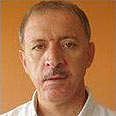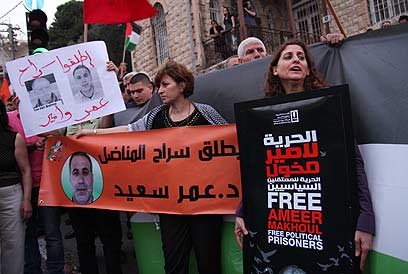
Following the arrest of writer and activist Ameer Makhoul for suspected espionage and contact with Hezbollah, many wondered who it was that Makhoul contacted that the Shin Bet considers a "foreign agent".
Ittijah (the Union of Arab Community-Based Associations) – an umbrella group for Arab NGOs in Israel which Makhoul heads – explained Monday that as part of his job description the writer met with many officials in an effort to raise funds.
"Ittijah holds a list composed by the State of Israel, of which organizations are permitted for contact and which constitute breaking the law," said Wakim Salame, a member of the organization's managing committee.
She said it was "absurd", however, that at times Israel lit upon an organization head whose views were not in line with the state's, and suddenly changed his status to "hostile".
"Suddenly, when you meet him at a convention, it becomes a meeting with a foreign agent and espionage. From time to time it changes. Once it was the PLO and then the Popular Front – now it's a trend to say an agent from Hezbollah," she said.
"The conferences he attends around the world are not like the Israeli ghetto," said Jafar Farah, who heads the Mossawa Center, an Israeli-Arab NGO. "There are also Iranian, Lebanese, and Iraqi lobbyists present there. Naturally conversations are started and even friendships. No one checks whether the people we speak to are on some Israeli blacklist."
'Aggressive policy towards Arabs'
Makhoul's arrest sparked anger among the various Arab organizations, which perceive Ittijah as a major milestone for the development of their sector. Many see his detainment as a direct insult by the state to their struggle.

Haifa protest (Photo: Avishag Shear Yeshuv)
Most of the NGO's, including the major Mossowa Center for Jewish and Arab equality and Adallah, an Arab legal aid center, were established in the '90s, while the Oslo Accords were being discussed. Many of them are also affiliated with Balad, the political party to which the second espionage suspect, Omar Said, belongs.
Ittijah was founded as an umbrella group for the various NGO's. "Its function was to act as a unifying umbrella, delegate professional positions, and coordinate to make sure there was no overlapping," Salame explained.
Another function Ittijah took upon itself was to raise funds and awareness for Arab society in Israel. "The money came mainly from large European funds," says the head of one of the NGO's that profit from Ittijah's fundraising.
"Makhoul was not considered a great fundraiser, so Ittijah has not been well-off financially over the past few years," he said. Indeed, the organization is currently supervising just 80 of the 2,000 Arab NGO's in Israel.
Though groups like Mossowa and Adallah have also turned independent over the years, Makhoul and Said's arrests still appeared to touch a nerve among all those involved in the wellbeing of Arab society.
"It feels like there is an atmosphere of de-legitimization against Arab political and social organizations in Israel, and we are all concerned about this," said Farah. "the claim that we are trying to create a state within a state is one which belongs to those who want to shut up the voice of Arab society."
"The policy towards us is aggressive," Salame agrees. "Ameer was not chosen for nothing. We are asked to live like trained beasts in rat traps."















